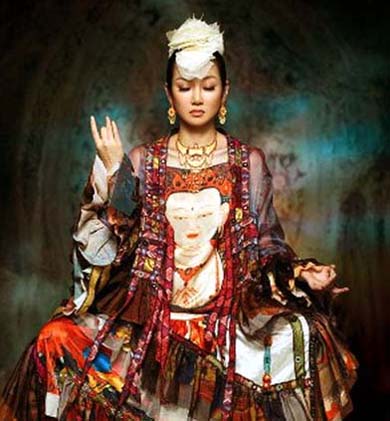Afrique, la rock alternative
Quand l’Upper West Side new-yorkais fraie avec le souk congolais, et qu’Oxford titille la polyrythmie ghanéenne, l’underground délocalise ses oreilles sur le continent africain pour mieux satisfaire sa soif de fraîcheur musicale. On avait connu la prise d’assaut de la péninsule indienne avec Asian Dub Foundation et la redoutable M.I.A, fusionnant electro, drum n’bass, jungle, avec un zeste de folklore indo-pakistanais. Ailleurs, les Brésiliens CSS et Bonde do Rolê ont mis à l’ordre du jour le funk carioca.
Polyrythmie. Mais alors que les promoteurs de ces fusions culturelles avaient tous plus ou moins un pied sur leur continent d’origine avant de s’exporter en Occident, voici cette fois l’exubérante polyrythmie africaine véhiculée par des gamins bercés par le rock indé, britannique ou américain. Kora sénégalaise, souk congolais, kuduro angolais, benga kenyan… les genres abondent. A l’origine de ces dérives : le hi-life. Né au Ghana et en Sierra Leone dans les années 20,c’est la première fusion entre mélodies occidentales et rythmiques tribales, combinant cuivres jazzy, guitare, batterie, basse, harmonica et accordéon. Des groupes comme The Tempos et The Black Beats ont contribué à populariser le hi-life dans les années 50, avant qu’il n’aboutisse à l’afrobeat ou au juju.
Aujourd’hui conjugué au post-punk (Foals), partie prenante d’un patchwork ambient (Yeasayer) ou encore choyé par quelques guitares (Vampire Weekend), le hi-life n’en est pourtant pas à sa première introduction dans l’indé occidental. Cités comme références, Paul Simon et son multiprimé Graceland - enregistré en plein apartheid à Johannesburg, précurseur de la world music -, David Byrne des Talking Heads, le producteur Brian Eno, ou, plus récemment, Damon Albarn, le leader de Blur, qui multiplie notamment les échanges avec le Mali. «On a tous grandi pendant que la planète rapetissait, autant sur un aspect économique que culturel : les médias nous donnent accès à n’importe quel endroit du monde en cliquant sur deux boutons», explique Ira Wolf Tuton, guitariste de Yeasayer. Et la curiosité fait le reste pour retrouver la matière première : radios, blogs, vieux disquaires… et enseignement supérieur. Comme pour Joanna Newsom, étudiante en musicologie, bien vite obsédée par les progressions de la kora et de la harpe africaines ; ou encore Ian Eagleson, docteur en ethnomusicologie kenyane, cofondateur du groupe Extra Golden.
Quand les érudits prolongent leurs recherches sur scène, d’autres se fient au hasard. «Sans le savoir, on jouait déjà de la guitare d’une façon assez similaire au hi-life , résume Yanis Philippakis, le chanteur de Foals. En fait, on cherchait juste quelque chose de nouveau à incorporer dans notre musique.» De fait, autoproclamés «vampires culturels», ces têtes chercheuses qui viennent de sortir leur premier album tentent le grand écart entre Tom Petty, Marvin Gaye, Mulatu Astatke et Konono n°1.
Contours. «Le défi, c’est de partir de ce patchwork d’influences pour faire quelque chose de nouveau avec. On essaie simplement d’élargir notre inspiration dans le but de réinterpréter ce que l’on voit comme étant de la musique pop», explique Ira Wolf Tuton. Le hi-life permet alors de redessiner les contours de la pop. Yannis Philippakis, de Foals, revendique cependant une démarche «plus intuitive» : «On aime créer à partir de textures disparates, fusionner des éléments culturellement différents dans un format pop. Créer quelque chose qui continue de communiquer à un niveau non intellectuel, en utilisant parfois des références occultes.»
Mystique. «Les communautés cherchent à partager une émotion particulière et, pour ce faire, combinent leurs forces pour donner à cette émotion une intensité de plus en plus grande. C’est ce qui m’excite avec la voix, l’idée de communier»,expose encore Ira Wolf Tuton, au nom de Yeasayer. Mais la connotation mystique ne séduit pas tous les groupes de néo-afro-pop, à commencer par Vampire Weekend. «Il faut veiller à ne pas opposer un Occident logique et moderne, au reste du monde, ancien et superstitieux», développe Ezra Koenig, chanteur du groupe américain, qui vient d’ailleurs d’enregistrer une chanson avec Esau Mwamwaya, du Malawi ( «il était vraiment très ouvert d’esprit»). De même, Foals a collaboré avec les Antibalas Afrobeat Orchestra et Ira Wolf Tuton se déclare durablement marqué par un voyage effectué jadis en Tunisie («une expérience incroyable») .
Louanges. Les groupes afro-pop se partagent aujourd’hui les louanges médiatiques, à l’image de Vampire Weekend, auréolé avant même la sortie de son premier album, arrivé dans les bacs que depuis quelques semaines. La bannière de cette mouvance, foncièrement disparate sur la forme (ambient, new wave, folk, souk, punk…), se justifie avant tout par une démarche similaire d’ouverture d’esprit, d’innovation musicale et un fonds rythmique et vocal tiré du hi-life, donnant une forme d’enthousiasme susceptible de faire chavirer les scènes occidentales.
MATHILDE CARTON













